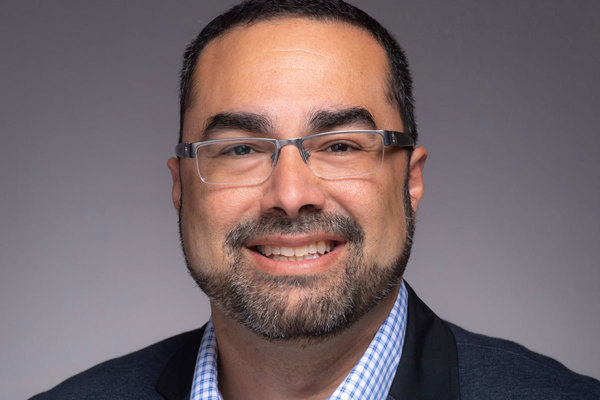
A dual research and teaching position attracted Felipe Santiago-Tirado to accept an offer from Notre Dame in 2018.
“I enjoy teaching,” said Santiago-Tirado, who taught a year at Cornell University in Ithaca, New York, while doing doctoral work in cell/microbiology. “Few places are good in both teaching and research.” Of the three offers he and his wife received, two were medical schools that did not include teaching as part of the contract. “Notre Dame is famous for academics and being a research powerhouse was great for me.”
He is an assistant professor in the Department of Biological Sciences, focusing on the cell biology of invasive fungal infections.
His wife, Ana Lidia Flores-Mireles, the Hawk Assistant Professor of Biological Sciences, researches catheter-associated urinary tract infections, the most common health-care infection worldwide.
The fact that he would come onto the faculty as the only person studying fungi also was a plus for the Puerto Rico-born scientist. He explained that an estimated 1.6 million people worldwide die each year from fungal infections, most of them in poor countries. While in the past most of these deaths were due to AIDS/HIV, now, due to medical advances, such as organ transplants, patients are more susceptible to fungal infections because of the use of immunosuppressants, or agents that suppress the body’s immune response. Chemotherapy patients and those who suffer from Crohn’s disease, for example, are just a few who might develop fungal disease, according to Santiago-Tirado.
“You don’t hear much about them because the press doesn’t cover them,” he said of fungal infections. “Educating the public in order to get funding is important.” Teaching allows him one avenue to do just that. The Boler-Parseghian Center for Rare and Neglected Disease Center at Notre Dame was another draw to come to the Midwest to teach and do research, as there are many similarities between some of these neglected diseases and fungal diseases.
Fungi can infect the lungs, blood and other organs such as the brain, doing enough damage to kill someone in less than two weeks. It is more powerful and deadly than most people, or even some scientists and doctors, realize. The general public remains aware of the common fungal infections, namely athlete’s foot, according to Santiago-Tirado, but they are unaware of major fungal killers like Cryptococcus or Candida.
“My current work is trying to understand how these fungi avoid being killed by our immune system and cause disease, with the hope that if we understand how they do that we may be able to influence that in favor of the patient,” he said. The few anti-fungal drugs currently on the market to combat these diseases motivate Santiago-Tirado to continue research hoping to gain enough understanding to help develop new treatments. “There are few anti-fungal medications and the ones out there are very toxic,” he said, adding that the pathogenic fungi are slowly acquiring resistance to all of them
South Bend was attractive to Santiago-Tirdao and his wife, who take advantage of its proximity to larger cities such as Chicago and Indianapolis. The couple travels to Puerto Rico and Mexico, his wife’s home country, every other year to stay connected with friends and family. While he has not gone back to Puerto Rico since Hurricane Maria, he said photographs indicate an island decimated of foliage with a very different appearance than he remembers. He’s grateful his family was unaffected and daily life is mostly back to normal, but unfortunately a few mountain villages will have to be relocated as electricity will never be restored.
The couple has a two-year-old son, Liam, who was born while they were studying at Washington University in St. Louis. (Yes, he was given an Irish name before they even considered Notre Dame). “We tried to get him to bundle up and play in the snow, but he didn’t want to,” he said.
Originally published by at science.nd.edu on August 27, 2019.